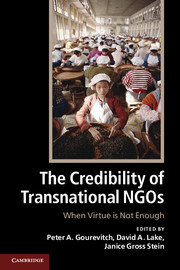3 - Credible certification of child labor free production
from Part I - Monitoring and NGOs
Published online by Cambridge University Press: 05 June 2012
Summary
Introduction
In the early 1990s, reports surfaced of the prevalence of child labor in many industries, including rugs and soccer balls. In the rug and carpet industry, critics alleged, children as young as four years old were being sold into bonded labor, their families receiving the equivalent of about $50 in return for several years of labor by the child. Children were expected to work weaving carpets for twelve or more hours a day while living in deplorable conditions. Some estimates were that as many as 1 million children were forced to work fifteen to eighteen hours a day weaving carpets across the countries of South Asia. Around the same time, allegations surfaced that the soccer balls sold by major sports companies including Umbro, Reebok, Adidas, and Mitre – which provides balls for Britain’s Football Association and Premier League – were being stitched together by Pakistani children, some of whom had been sold into bonded labor by their parents. The reports indicated that children as young as six years old were being paid 10 pence for a single football that would later sell for 50 pounds.
Reports of the prevalence of child labor in the making of rugs and soccer balls were part of a larger global awareness about exploitative working conditions by multi-national corporations. This era of “stateless regulation” (Seidman 2005, 2007) – in which exploitative working conditions proliferated as corporations took advantage of governments’ reluctance and inability to enforce labor regulations when faced with the threat posed by mobile capital – resulted in the growing involvement of non-governmental organizations (NGOs) in monitoring corporations. NGOs have used the threat of “naming and shaming” corporations they deem to fall below minimum thresholds of “ethical behavior” to influence consumer behavior in the belief or hope that consumers will be unwilling to tolerate and support such businesses. Businesses, in turn, wishing to protect the value of their brand seek to avoid such embarrassment and so respond to NGO demands by either offering their own codes of conduct to which they promise to adhere or by agreeing to be monitored by the NGO in exchange for certification of good behavior which they can tout to discerning consumers as evidence of their ethical behavior (Conroy 2007; Seidman 2007).
- Type
- Chapter
- Information
- The Credibility of Transnational NGOsWhen Virtue is Not Enough, pp. 62 - 85Publisher: Cambridge University PressPrint publication year: 2012
- 5
- Cited by



